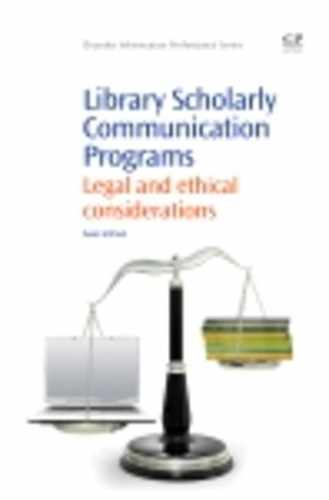0%
29Chapters
0-1Hours read
0kTotal Words
Book Description
Libraries must negotiate a range of legal issues, policies and ethical guidelines when developing scholarly communication initiatives. Library Scholarly Communication Programs is a practical primer, covering these issues for institutional repository managers, library administrators, and other staff involved in library-based repository and publishing services. The title is composed of four parts. Part one describes the evolution of scholarly communication programs within academic libraries, part two explores institutional repositories and part three covers library publishing services. Part four concludes with strategies for creating an internal infrastructure, comprised of policy, best practices and education initiatives, which will support the legal and ethical practices discussed in the book.- Demonstrates the importance of creating a policy infrastructure for scholarly communication initiatives
- Offers a novel combination of legal and ethical issues in a plain, approachable format
- Provides samples of policy and contract language, as well as several case studies, to illustrate the concepts presented
Table of Contents
- Cover image
- Title page
- Table of Contents
- Copyright
- List of boxes
- List of abbreviations
- Acknowledgments
- Preface
- About the author
- Part 1: Libraries and scholarly communication
- Part 2: Institutional repositories
- Introduction
- Chapter 2: Institutional repositories and intellectual property
- Chapter 3: Research ethics
- Chapter 4: Privacy and propriety
- Chapter 5: Repository policies
- Abstract:
- Collection management policies
- Repository submission agreements
- Grant of license to the institution
- Assurances from the contributor
- Beyond single submissions: memoranda of understanding
- Addressing end users: terms of use, privacy, and disclaimers
- Legal compliance
- Conclusion: context changes, but ethics remain
- Part 3: Library publishing services
- Introduction
- Chapter 6: Ethical and legal issues in journal publishing
- Chapter 7: Publication ethics
- Chapter 8: Intellectual property and publishing
- Abstract:
- Permissions and fair use: protecting the balance of copyright in the process of creation
- Author publishing agreements: protecting authors’ rights
- Licensing: protecting readers’ ability to build on authors’ work
- Beyond the balance: further intellectual property considerations
- Protecting intellectual property through policy (and contract)
- Chapter 9: Publishing policies
- Part 4: The road forward
- References
- Index
